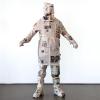Search Results
Showing results 1 to 20 of 21
Measuring Rules
Source Institutions
In this math activity, learners create their own units of measurement by making noodle rulers. Learners practice estimating and measuring objects using the noodle rulers .
Shady Snakes
Source Institutions
In this activity, learners make pretend snakes and use them to explore estimation and measurement. Learners roll out clay snakes and estimate and measure their lengths and diameters.
Stack-o-Pennies Shop
Source Institutions
In this math activity, learners pretend there is a special store that lets you pay for toys by their height in pennies.
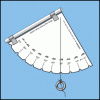
Making a Simple Astrolabe
Source Institutions
In this activity, learners make an astrolabe, a device used for measuring altitude, including the height of objects in the sky.
The Right Fit
Source Institutions
In this math activity, learners trace their hands and estimate the number of beans that can fit into their hand tracings. Then, learners glue the beans to the tracing to test out their estimations.
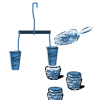
A Question of Balance
Source Institutions
In this activity, learners explore how engineers use scales and measures when designing a manufacturing process to ensure that final products are uniform in weight or count.

Measure the Pressure II: The "Dry" Barometer
Source Institutions
In this activity, learners use simple items to construct a device for indicating air pressure changes.
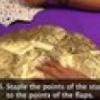
Party Hat Symmetry
Source Institutions
In this hands-on activity, learners make New Year's Eve party hats out of wrapping paper. Learners use symmetry and measurement to cut out shapes they need to assemble the hats.
Penny Estimation
Source Institutions
In this math activity, learners estimate how many pennies are in a jar by predicting and counting handfuls of pennies.
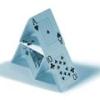
Critical Load
Source Institutions
In this activity, learners explore the concepts of structural engineering and how to measure the critical load, or the maximum weight a structure can bear.
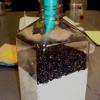
Earth Atmosphere Composition
Source Institutions
In this activity, learners use rice grains to model the composition of the atmosphere of the Earth today and in 1880. Learners assemble the model while measuring percentages.
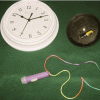
Can Energy be Created or Destroyed?
Source Institutions
In this activity, learners explore conservation of energy by experimenting with a solar cell light device.
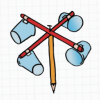
Twirling in the Breeze
Source Institutions
In this engineering activity, learners build a device (an anemometer) to measure how fast the wind is blowing.
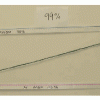
Atmosphere Composition Model
Source Institutions
In this activity, learners create a model using metric measuring tapes and atmosphere composition data.
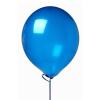
Up, Up, and Away
Source Institutions
In this math lesson, learners explore the real world meaning of slope. Learners conduct a balloon experiment in which they measure the circumference and flight time of deflating balloons.
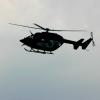
Round & Round
Source Institutions
In this activity, learners make and test fly paper helicopters. Learners use templates to create paper helicopters and then take take turns flying them in the air.

Temperature Tactics
Source Institutions
In this activity, learners explore the devices used over time to measure changes in temperature.
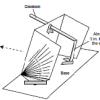
Using a Sundial
Source Institutions
In this activity (on page 12 of the PDF), learners make a sundial (shadow clock) appropriate for their geographic location in the northern hemisphere and use it to tell time.

Measure the Pressure: The "Wet" Barometer
Source Institutions
In this activity, learners use simple items to construct a device for indicating air pressure changes.

